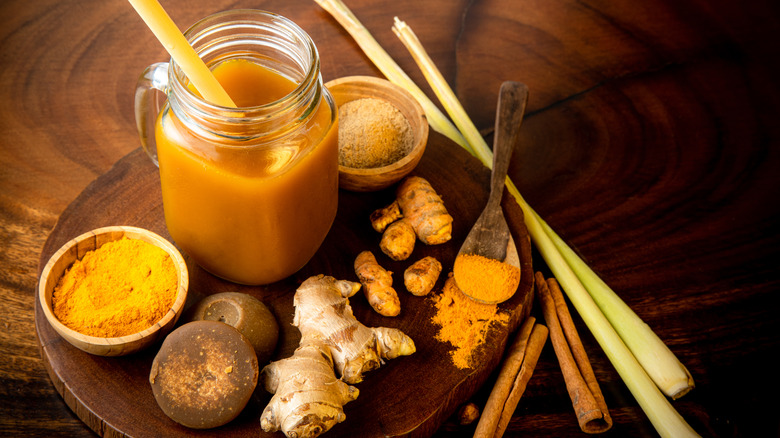What Is Jamu Juice And Is It Good For You?
Have you ever heard of Jamu juice, a centuries-old remedy used in Asian medicine? This concoction of herbs and spices is prized for its anti-cancer, antiviral, antifungal, and anti-diabetes effects. What's more, some of its active compounds support heart health and digestive function, according to a 2006 research paper published by the University of Groningen. Its name comes from "jampi," an ancient word that means "magic potion" in the Javanese language, according to a 2020 review featured in the journal Diabetes and Metabolic Syndrome.
The beverage originates in Indonesia, but you can prepare it at home or buy it online — regardless of where you live. Traditional Jamu products contain a mix of plants with potential health benefits, explains the University of Groningen. Some are made with herbs and spices that fight inflammation, boost immune function, or energize the body, while others may help relieve back pain and sore muscles. There are many different ways to make Jamu, but common ingredients include turmeric, ginger, lemon, and honey (via Everyday Health).
Jamu juice is relatively new to the U.S. market, but it may be worth your attention. Chances are, you'll see it on Instagram, Facebook, and other social networks. The question is, does it live up to the hype? Most importantly, is it safe? Let's see what the research says.
Jamu has some surprising health benefits
This traditional Indonesian beverage is widely consumed for its anti-inflammatory and energizing effects, among other benefits. Some of the plants used in Jamu fight oxidative stress, promote liver health, and reduce blood sugar, according to clinical evidence published by the University of Groningen.
A 2020 review suggests that Panax ginseng, turmeric, astragalus, ginger, and other ingredients in certain Jamu recipes can enhance the immune response and ease some of the symptoms associated with COVID-19, reports the journal Pharmaceutical Sciences and Research. Jamu juice may also contain green chiretta, aka Andrographis paniculata, a plant with antiviral, anti-inflammatory, and fever-reducing effects, according to 2022 evidence presented in Phytochemistry Reviews. In clinical trials, this herb has been shown to alleviate headaches, fatigue, throat pain, and other symptoms in people with upper respiratory tract infections.
The University of Groningen also says that Jamu may reduce high blood pressure, suppress tumor growth, and reduce muscle and joint pain. Note, though — most studies have been conducted on rats or in a controlled lab environment, so their findings may not apply to humans. Plus, Jamu juice may be more or less effective, depending on the ingredients used.
How safe is Jamu juice?
Just because something is natural doesn't mean it's safe. Jamu juice may pose fewer health risks than some medications, but it can still have adverse effects. Kava-kava, one of the most commonly used ingredients in this beverage, can affect digestion and cause fatigue, warn the authors of a 2006 review published by the University of Groningen. Similarly, Echinacea and Panax ginseng can upset your stomach and make you feel tired. Licorice root, on the other hand, may increase blood pressure and cause electrolyte imbalances.
As the researchers note, these side effects are not necessarily dose-dependent. You may experience adverse reactions to one or more ingredients because of your age, genetics, or health condition, among other factors. Plus, some herbs may interact with one another or with other drugs you're taking. For example, turmeric shouldn't be used along with Ibuprofen, aspirin, or anticoagulants. This plant can influence drug metabolism and increase the toxicity of certain medications, explains Memorial Sloan Kettering Cancer Center.
All in all, an occasional glass of Jamu juice is unlikely to harm your health. As with everything else, moderation is key. Your best bet is to prepare this drink at home or choose a brand that uses organic ingredients. Vegan chef Bettina Campolucci Bordi, founder of Bettina's Kitchen, recommends a simple recipe that calls for turmeric, ginger, coconut water, fresh citrus juice, and a pinch of black pepper. Mix everything into a blender, strain the juice, and enjoy!



